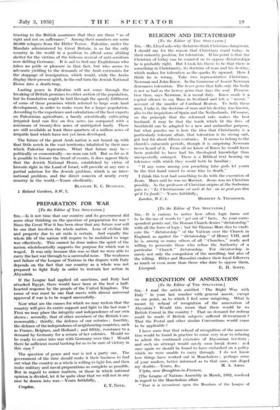RELIGION AND DICTATORSHIP
[To the Editor of THE SPECTATOR.] SIR,—Mr. Lloyd asks why dictators think Christians dangerous. I should say for the reason that Christians stand today, in their minority position, for toleration. If his point is that the Christian of today can be counted on to oppose dictatorships he is probably right. But I took his theSis to be that there is something in Christianity, its doctrine of man and his destiny, which makes for toleration as the sparks fly upward. Here I think he is wrong. Take two representative Christians, Newman and John Knox. In the Grammar of Assent Newman denounces toleration. The fever germ that kills only the body is not so bad as the heresy germ that slays the soul. Persecu- tion then, says Newman, is a moral- duty. Knox made it a capital offence to say Mass in Scotland and left a " merrie " account of the murder of Cardinal Beaton. To both these men, I take it, the doctrine of man and his destiny was known, also to the inquisitors of Spain and the Netherlands. Of course, on the principle that the reformed rake makes the best husband, it may be that the torch which lit the fires of Smithfield can be adapted to a new and unfamiliar purpose, but what puzzles me is how the idea that Christianity is a particularly tolerant affair, that toleration is its strong suit, got lost for about fifteen centuries. It seems to belong to the church's catacomb periods, though it is surprising Newman never heard of it. From all we know of Knox he would have been grateful to have had his theological knowledge thus unexpectedly enlarged. There is a Biblical text bearing on tolerance with which they would both be familiar :
" If any come among you preaching false gods let yours be the first hand raised to stone him to death."
I think this text had something to do with the execution of Jesus. Marx said he was no Marxist. Jesus was no Christian possibly. As the professor of Christian origins at the Sorbonne puts it : " Le Christianisme est sorti de lui ; on ne pent pas dire Tr-it l'a fonde."—Yours faithfully,














































 Previous page
Previous page